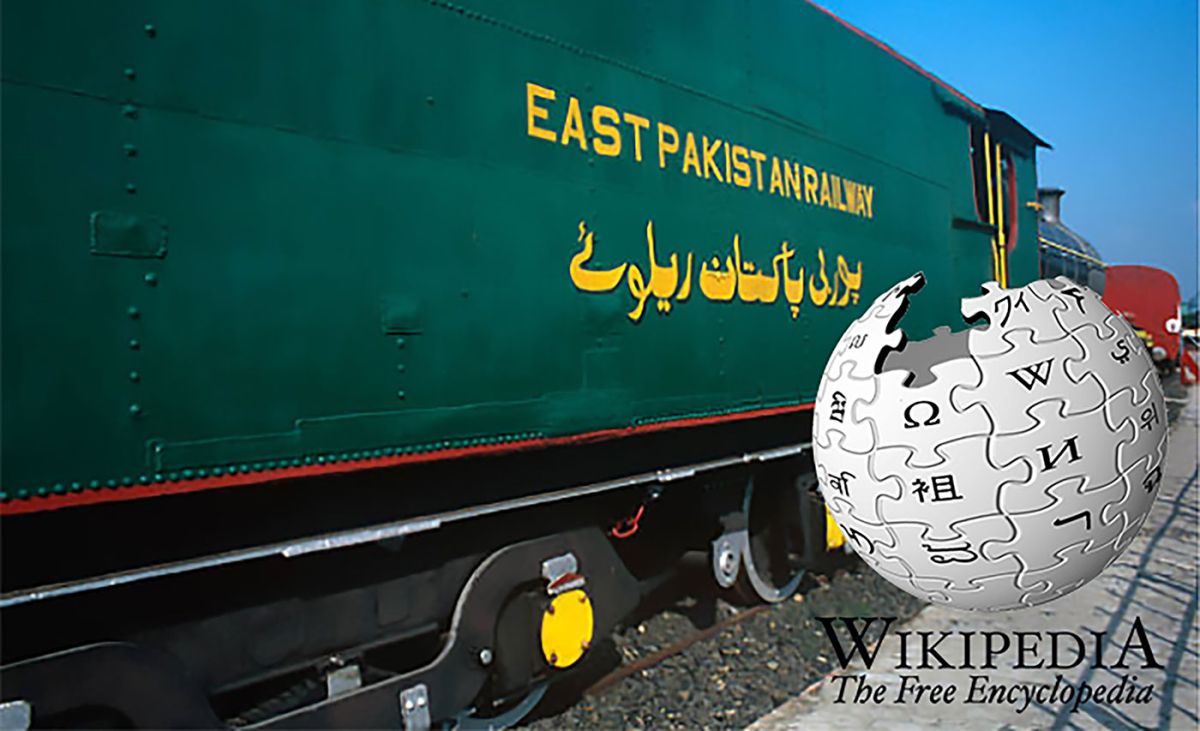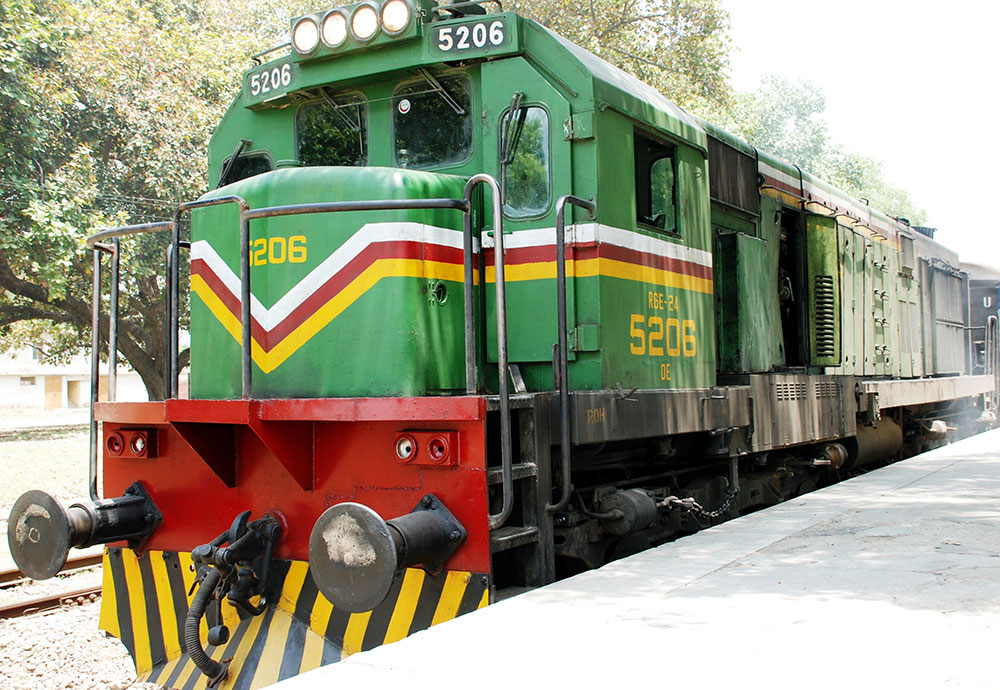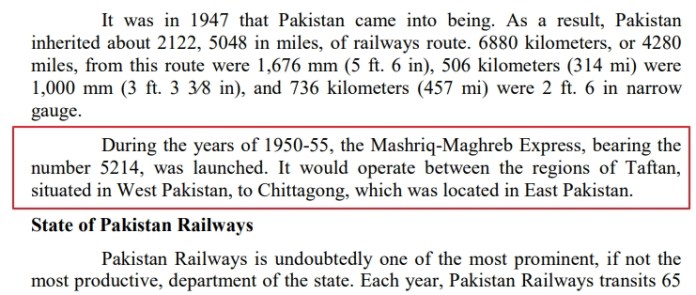MORE COVERAGE
Twitter Coverage
Satyaagrah
Written on
Satyaagrah
Written on
Satyaagrah
Written on
Satyaagrah
Written on
Satyaagrah
Written on
JOIN SATYAAGRAH SOCIAL MEDIA
Information about a fictitious train on ‘reliable’ Wikipedia, picked up by websites and academic journals: Here is how it originated

Wikipedia, the crowd-sourced online encyclopaedia, is considered as a reliable source of information worldwide, including by search giant Google. The founders and administrators of the site proudly proclaim how nothing can be put on Wikipedia without reliable sources. The left-leaning website has even black-listed several right-leaning media houses, which means those media houses are not considered as reliable sources for citing in Wiki pages.
However, it has come to notice recently that for almost four years, details of a fictional train was mentioned in the Wikipedia page of Pakistan Eastern Railway, and it managed to fool lots of people, including Punjab University in Lahore. Pakistan Eastern Railway was later renamed to Bangladesh Railway after East Pakistan gained independence and became Bangladesh.
On 28th November 2016, one Wikipedia editor that goes by the username PAKHIGHWAY made an edit to the wiki page of Pakistan Eastern Railway, where the user inserted details about a train named Mashriq-Maghreb Express, with train number 5214.
 |
The edit said that the train ran from 1950 to 1955, and operated from Koh-e-Taftan in West Pakistan to Chittagong in East Pakistan. The wiki page also said that the train used Indian Railway track and rolling stock between Attari and Benapole.
 |
Soon the details of this train started to appear on Facebook posts and blogs, and it made its way to a research paper published by Punjab University in Lahore. The paper titled “Why Pakistan Railways Has Failed To Perform: A Special Focus On Passenger Perspective”, copy-pasted the line about Mashriq-Maghreb Express from the Wikipedia article.
 |
This was an obvious fake information, there is no evidence that any direct train ran between West Pakistan and East Pakistan through India. If it was there, it would have been a well-known historical fact by now. Actually, Muhammad Ali Jinnah had proposed a 1,280-km long transit corridor between the two segments of Pakistan at that time, but neither the British govt nor the Congress party agreed to it.
The claims made in the Wikipedia edit also defied logic, as there was no reason why such an important train will run from Koh-e-Taftan, Pakistan’s western-most Railway station, located in a small mountainous border town. Any such train would have run from major West Pakistan cities like Lahore, Karachi etc. Similarly on the eastern side, Chittagong is located on the easternmost side of Bangladesh. Any train from West Pakistan would have most probably terminate at Dhaka.
Despite lack of any evidence and such logical errors, the information about Mashriq-Maghreb Express remain on the Wikipedia page for 3 years. Only in August last year, someone deleted that sentence after noticing that no link has been provided for the train, and not mentioned in any reliable source.
|
It is not known why the user with the username PAKHIGHWAY made the edit. Coincidently, that user has been permanently banned from Wikipedia, although for other reasons. According to Wikipedia, the user has been banned for indefinite time for abusing multiple accounts and using talk page to argue with other users.
Doubtful claims behind the edit
The matter about Wikipedia carrying fake information for 4 years came to light after a Facebook post appeared on Social Media, where people claimed to have made the edit to “deter ‘googlers’ on the NALSAR quizzing website”. The claim, posted by multiple on Facebook, says that after making the edit, the person forgot to revert it, and later it became almost impossible to do so, as it had been mentioned in some academic articles, and even in official Pakistan Railway websites.
However, most people making this claim are Indians, and from the edit history of PAKHIGHWAY who had made the change to Wiki page, it can be concluded that the user is Pakistani as all others edits made by the user are Pakistan related.
The Facebook post also says there couldn’t even have been such a train at the time, as the break of gauge would have made it impossible. However, that is not true, as West Pakistan, East Pakistan and India, all three inherited the same Railway infrastructure built by British govt, and trains regularly ran across these three areas before independence.
Therefore, although it was true that the Wikipedia article carried fictional information for three years, the claims behind it are most probably fake.
 Support Us
Support Us
Satyagraha was born from the heart of our land, with an undying aim to unveil the true essence of Bharat. It seeks to illuminate the hidden tales of our valiant freedom fighters and the rich chronicles that haven't yet sung their complete melody in the mainstream.
While platforms like NDTV and 'The Wire' effortlessly garner funds under the banner of safeguarding democracy, we at Satyagraha walk a different path. Our strength and resonance come from you. In this journey to weave a stronger Bharat, every little contribution amplifies our voice. Let's come together, contribute as you can, and champion the true spirit of our nation.
 |  |  |
| ICICI Bank of Satyaagrah | Razorpay Bank of Satyaagrah | PayPal Bank of Satyaagrah - For International Payments |
If all above doesn't work, then try the LINK below:
Please share the article on other platforms
DISCLAIMER: The author is solely responsible for the views expressed in this article. The author carries the responsibility for citing and/or licensing of images utilized within the text. The website also frequently uses non-commercial images for representational purposes only in line with the article. We are not responsible for the authenticity of such images. If some images have a copyright issue, we request the person/entity to contact us at This email address is being protected from spambots. You need JavaScript enabled to view it. and we will take the necessary actions to resolve the issue.
Related Articles
- Aatish Taseer shows how his ‘jamaat’ has mastery over playing victim, brands Bollywood pro-Modi even as it remains anti-Hindu
- Here is a list of 20 incidents where the ‘Jai Shri Ram’ slogan has been misused to turn a random crime into ‘hate crime’
- Wikipedia dismisses Love Jihad as a conspiracy theory by Hindus, but claims reverse Love Jihad against Muslims is real
- Dhruv Rathee fans mark YouTuber Karolina Goswami for targeted harassment after she exposed his lies
- India successfully carried out the test firing of a new missile of the Agni series known as Agni-Prime
- More controversial TISS papers surface: ‘India controlled Kashmir’, ‘Military Occupation’, romance with a research subject and embracing Islam
- Ghaziabad: Samajwadi leader Umed Idris booked for giving false communal twist to assault incident, making victim lie about case
- Mass religious conversion racket reaches Gujarat: How Santosh went missing and returned as Abdullah
- Vishal Jood – a Bharatiya student targeted by Khalistanis and jailed by Australia
- US Justice Department takes down 36 Iranian websites from Iranian Islamic Radio and Television Union and KH: Read full details
- Netizens demand action against Bollywood entertainer Swara Bhasker for peddling fake news and defaming ‘Jai Shri Ram’
- Farmer org releases unclear video to claim man committed suicide at Tikri border, clearer video shows man accusing ‘farmer’ of setting him on fire
- Shoaib Akhtar endorses AMU founder’s two-nation theory that caused partition: Not some stupid comment but a statement of fact
- UP mass conversion: How Darsh Saxena, Rajeshwari and Priyanka became Mohd Rehaan Ansari, Razia and Fatima, more details emerge
- “Prepare to be sued”: Former IFS officer Lakshmi M Puri shuts up Congress supporter Saket Gokhale for misleading allegations against her


























